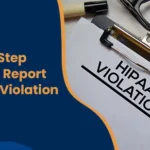Guide to How Often Is HIPAA Training Required?

September 6, 2024
If you work in healthcare, staying compliant with the Health Insurance Portability and Accountability Act (HIPAA) isn’t just a best practice, it’s the law. But one question comes up a lot: How often is HIPAA training required?
The answer matters more than you might think. Studies show that nearly 40% of healthcare data breaches happen because of simple human error. That means one of the best ways to protect patient information is through regular, effective HIPAA training.
Here’s what the law says: HIPAA requires training for all new employees. But it doesn’t give a strict timeline for follow-up sessions. That’s why most organizations schedule refresher training at least once a year. These sessions help teams stay updated on new regulations, common risks, and the right ways to handle patient data.
In short, frequent training not only supports HIPAA compliance—it also builds a culture of awareness and accountability across your team.
What Are HIPAA’s Training Requirements for Healthcare Employees?
HIPAA doesn’t lay out exact timelines for training, but it does require that employees are trained to understand privacy and security practices. The focus is on making sure staff know how to properly handle and protect patient privacy
Here are the main areas your training should include:
- Training Frequency: While HIPAA doesn’t set a fixed schedule, annual training is widely recommended to keep employees informed.
- Security Awareness: Staff should be taught how to recognize phishing attempts and other cyber threats that could lead to a data breach.
- Access Control: Training should explain who’s allowed to access patient data and who isn’t.
- Breach Reporting: Employees need to know how to report a potential data breach quickly and accurately.
- Patient Rights: Training should cover patients’ rights under HIPAA, including access to their own medical records.
- Confidentiality Practices: Emphasize that patient information must be kept private at all times, inside and outside the workplace.
Even though HIPAA doesn’t give exact training dates, regular refreshers are a smart move. They help reduce human error and strengthen your organization’s overall HIPAA compliance.
🔗 Read More: What is Protected Health Information
How Often Is HIPAA Training Required?
Knowing how often to conduct HIPAA training is key to staying compliant and protecting patient data. While the law gives some direction, it leaves the frequency of ongoing training up to each organization. That said, here’s what’s generally expected:
- Initial Training: All new hires should be trained on HIPAA basics when they join.
- Annual Refreshers: Yearly training is a widely accepted best practice to keep everyone updated.
- Policy Updates: If there are significant changes to HIPAA policies or procedures, mandatory retraining is necessary.
- Refresher Courses: These should be implemented periodically to reinforce key concepts and help prevent knowledge gaps.
- Training Records: It’s important to document every training session to demonstrate HIPAA compliance.
- Role-Based Training: Employees should get training that’s relevant to their specific job functions and responsibilities.
How Often Should Healthcare Staff Get Security Awareness Training?
In healthcare, protecting patient data isn’t just important—it’s critical. One of the most effective ways to guard against threats? Ongoing security awareness training. While Health Insurance Portability and Accountability Act (HIPAA) training covers the basics, keeping employees sharp means going a step further.
Here are a few ways healthcare organizations can keep that training consistent—and effective:
- Adaptive Training
Increase training during high-risk periods when cyber threats are more common. - Random Simulations
Send out unannounced phishing tests or run mock security drills to see how ready your team really is. - Peer Learning Sessions
Every few months, bring the team together to share real experiences, practical tips, and lessons learned. - Microlearning Modules
Use short, monthly lessons that focus on one topic at a time. They’re easy to digest and keep knowledge fresh. - Audit-Triggered Training
If an internal audit finds a gap in knowledge or process, follow up with targeted training to fix it fast. - On-Demand Refreshers
Offer easy access to quick training videos or resources so employees can brush up anytime. - Security Culture Days
Host events twice a year to get everyone thinking about best practices and learning new tactics.
What Happens If You Don’t Provide Proper HIPAA Training?
Skipping HIPAA training might not seem like a big deal—until it is. Inadequate training doesn’t just lead to mistakes. It can lead to lawsuits, fines, and serious damage to your organization’s reputation.
Here’s what’s at stake when training is overlooked:
- Financial Penalties
Fines can cost anywhere from $100 to $50,000 per violation, with totals reaching up to $1.5 million per year. - Civil Liability
If a privacy violation or a data breach happens due to lack of training, your organization could face civil lawsuits. - Criminal Charges
Willful neglect or intentional violations can lead to criminal charges, fines and even jail time. - Corrective Action Plans
The Department of Health and Human Services (HHS) may force your team to create and follow a mandatory training improvement plan. - Reputation Damage
A privacy breach can break patient trust. Rebuilding that trust? Much harder. - More Frequent Audits
Once on the government’s radar, your organization may be audited more often, increasing compliance pressure.
The bottom line: proper HIPAA training helps you avoid expensive consequences and builds a safer environment for both patients and staff.
Why HIPAA Training Matters: Key Benefits for Your Organization
HIPAA training delivers real value for both healthcare organizations and their employees. It helps protect patient information and ensures everyone follows the right regulations. Here are the key advantages:
- Better Compliance: Staff are more likely to follow HIPAA rules when they understand them clearly.
- Prevention of Data Breaches: People trained to spot risks like phishing emails or weak passwords can help prevent security incidents.
- Stronger Patient Trust: When patient data is handled correctly, it reflects a strong commitment to privacy and builds trust.
- Legal Protection: Proper training can help shield your organization from lawsuits and regulatory action.
- More Confident Employees: With the right training, staff can handle sensitive information securely and confidently.
- Faster Reactions to Issues: Trained staff can respond to security incidents swiftly and efficiently.
- Stronger Culture: Prioritizing privacy builds a workplace where accountability and integrity are part of the norm.
🔗 Read More: What Is The Purpose of HIPAA in 2024?
How to Sign Up for a HIPAA Training Course
Signing up for a HIPAA training course is easier than you might think. Whether you’re an individual or running a team, here’s how to get started:
- Figure Out What You Need
Do you need the basics, something more advanced, or a course tailored to your specific role? - Research Your Options
Choose a provider with strong reviews and up-to-date training materials. - Review the Curriculum
Check that it covers key topics—like privacy rules, security protocols, and what to do in case of a breach. - Check Accreditation
Go with a provider that offers recognized certification or is backed by a credible authority. - Pick a Format That Fits You
Some people prefer online courses, others like in-person sessions. Hybrid options are also common. - Register and Pay Online
Most platforms make it simple to enroll right from their website. - Save the Details
After signing up, save your confirmation and check for any prep work before you begin.
The sooner you get started, the more confident you (and your team) will be in protecting sensitive health information.
Final Thoughts: How Often Do You Really Need HIPAA Training?
While HIPAA doesn’t lay down a strict rule, most experts agree on this: train your team when they’re hired and give them a refresher every year after that.
More than just avoiding fines, HIPAA training helps build a workplace where privacy, accountability, and trust are part of the culture. And that’s something every healthcare organization should aim for.





